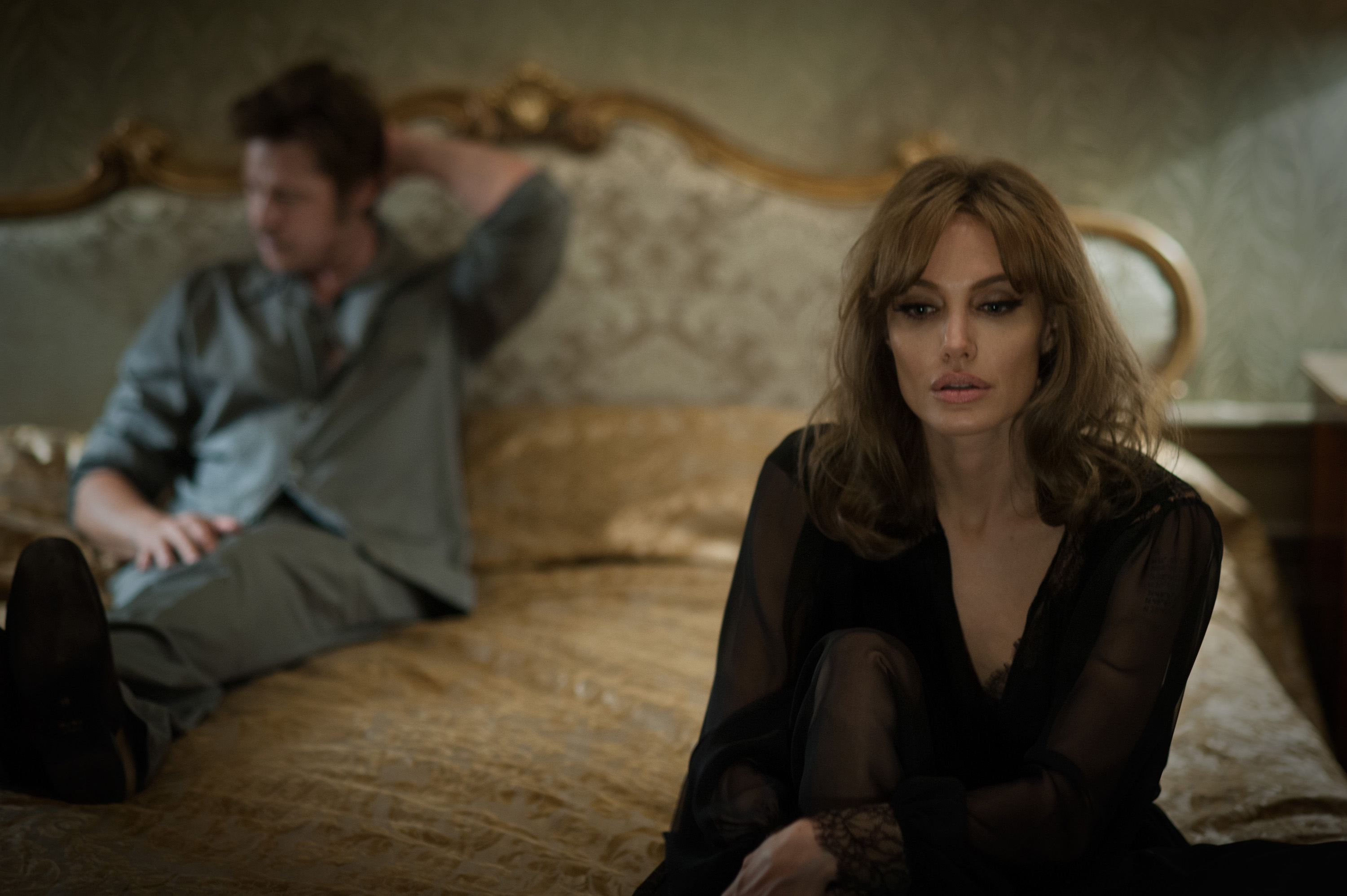Angelina Jolie's By the Sea, and the triumphant return of the Hollywood melodrama
The melodrama's unexpected resurgence on television is finally showing up on the big screen


A free daily email with the biggest news stories of the day – and the best features from TheWeek.com
You are now subscribed
Your newsletter sign-up was successful
The trailer for By the Sea isn't really a conventional movie advertisement. It's more like a minute-long experimental short about a relationship falling apart.
It begins with a couple — played by writer/director/star Angelina Jolie and her real-life spouse, Brad Pitt — entering a luxurious French resort suite. It ends with a wide shot of the husband storming out, with the wife sprawled on the floor, unmoving. In between, they drink and smoke and yell and fight, as Harry Nilsson's "Perfect Day" plays ironically in the background.

With its tantalizing blend of hysteria and sun-dappled shores, By the Sea, which hits theaters in wide release Friday, is practically the textbook definition of melodrama. It's a curious choice for Jolie, a filmmaker whose previous efforts centered on the Bosnian War and World War II. This new project is either a self-indulgent exercise in celebrity privilege or a self-aware send-up of the celebrity gossip machine, depending on who you ask.
The Week
Escape your echo chamber. Get the facts behind the news, plus analysis from multiple perspectives.

Sign up for The Week's Free Newsletters
From our morning news briefing to a weekly Good News Newsletter, get the best of The Week delivered directly to your inbox.
From our morning news briefing to a weekly Good News Newsletter, get the best of The Week delivered directly to your inbox.
But if By the Sea is an outlier in Jolie's young directorial career, it's very much in line with an unexpected but triumphant new trend: the return of melodrama — a subgenre that seemed all but dead just a decade ago. It's not just a classical melodrama like By the Sea; it's in the DNA of movies like Crimson Peak and Brooklyn and TV shows like Scandal and Empire.
Like noir, melodrama is defined as much by content as it is by style and an attitude. Originating in Victorian-era theater, it is most easily recognized as excess: a dependence on larger-than-life emotions that spill into the surrounding production. In the purest melodramas, everything — the acting, the color palette, the musical score — is embellished beyond believability, with the aim of extracting a heightened emotional reaction from the audience. In cinema, melodrama reached its height during the 1940s and 1950s in films like Irving Rapper's Now, Voyager and Douglas Sirk's All That Heaven Allows.
In classical Hollywood, "melodrama" applied to genres as disparate from romance as horror and crime thrillers (see Vertigo, which creates its mood of erotic suspense with melodramatic techniques). But today, it's often associated with femininity, referring to so-called "weepies" or "women's pictures." As a result, melodrama's critical reputation has taken a hit — like romantic comedies, which are similarly disparaged for lacking subtlety and having contrived plots. (Never mind that action movies often feature the same bugs without eliciting any of the same sneering disdain.)
But gender bias is hardly the sole culprit in melodrama's marginalization. The rise of method acting and the development of more sophisticated technology have trained audiences to expect realism in art, lowering collective tolerance for any artifice — even intentional artifice. When Hollywood spends hundreds of millions to ensure that even superhero and monster movies appear photorealistic, the irony-free theatricality of melodrama feels painfully out of sync.
A free daily email with the biggest news stories of the day – and the best features from TheWeek.com
Despite those broader trends, audiences never entirely lost their taste for melodrama. You could find its influence in period-piece romances like The English Patient and Titanic, musical spectacles like Moulin Rouge! and Dreamgirls, and adolescent-skewing book adaptations like The Notebook and the Twilight saga. And even as it faded from film, melodrama flourished on television in the form of daytime serials. Despite near-constant derision, soap operas remained a staple of American TV since the 1950s, continuing to thrive well into the 1990s.
Only recently, though, has melodrama started to reenter the mainstream. Which begs the logical question: why now?
The simplest answer can be found in the work of TV's reigning Queen of Melodrama: Shonda Rhimes, creator of Grey's Anatomy, Private Practice, and Scandal and producer of How to Get Away with Murder. Rhimes' brilliance was in recognizing that melodrama — with its colorful characters and sensational narratives — was uniquely suited to modern television, which pressures shows to continually find new means of hooking viewers with limited time and attention.
Add cable, streaming, and DVRs into the mix, and you've cracked the formula for an addictive binge-watch. While other, purportedly more "highbrow" TV shows flounder in their niches, Scandal and Co. have become legitimate phenomena — largely because their full-throttle pacing and penchant for outlandish, game-changing plot developments demand social media participation. Following the grand melodramatic tradition, these shows are designed to provoke the strongest possible emotional reaction, encouraging people to share their commentary online and turning viewership itself into an interactive event.
Networks have been quick to emulate Rhimes' formula, turning the steady drip of melodramatic TV into a deluge. On any given night, viewers can satisfy their cravings for action-packed narrative and uninhibited emotion with Empire, Fox's hip-hop/Shakespeare mash-up; Quantico, ABC's terrorism conspiracy thriller; UnREAL, Lifetime's reality TV satire; Jane the Virgin, the CW's telenovela adaptation; and Game of Thrones, HBO's fantasy political saga. As Vulture’s Margaret Lyons points out, primetime soaps offer an exciting — and, at their best, meaningful — antidote to the cerebral intensity of "prestige" antihero dramas like Mad Men and Breaking Bad.
Will By the Sea have the same influence at the multiplex? Based on the lukewarm tracking for the film's already limited release, moviegoers should probably keep their expectations in check. But its very existence suggests that melodrama is still very much alive. Enterprising filmmakers would be wise to overcome their snobbery and embrace its addictive power.
Amy Woolsey is a freelance writer who recently graduated from George Mason University in Fairfax, Virginia. Her writing has appeared in the Mason student newspaper, Fourth Estate, and Bitch Flicks, a feminist pop culture website. She blogs about film and TV at theauramusings.wordpress.com.
-
 Health insurance: Premiums soar as ACA subsidies end
Health insurance: Premiums soar as ACA subsidies endFeature 1.4 million people have dropped coverage
-
 Anthropic: AI triggers the ‘SaaSpocalypse’
Anthropic: AI triggers the ‘SaaSpocalypse’Feature A grim reaper for software services?
-
 NIH director Bhattacharya tapped as acting CDC head
NIH director Bhattacharya tapped as acting CDC headSpeed Read Jay Bhattacharya, a critic of the CDC’s Covid-19 response, will now lead the Centers for Disease Control and Prevention
-
 Walter Isaacson's 'Elon Musk' can 'scarcely contain its subject'
Walter Isaacson's 'Elon Musk' can 'scarcely contain its subject'The latest biography on the elusive tech mogul is causing a stir among critics
-
 Welcome to the new TheWeek.com!
Welcome to the new TheWeek.com!The Explainer Please allow us to reintroduce ourselves
-
 The Oscars finale was a heartless disaster
The Oscars finale was a heartless disasterThe Explainer A calculated attempt at emotional manipulation goes very wrong
-
 Most awkward awards show ever?
Most awkward awards show ever?The Explainer The best, worst, and most shocking moments from a chaotic Golden Globes
-
 The possible silver lining to the Warner Bros. deal
The possible silver lining to the Warner Bros. dealThe Explainer Could what's terrible for theaters be good for creators?
-
 Jeffrey Wright is the new 'narrator voice'
Jeffrey Wright is the new 'narrator voice'The Explainer Move over, Sam Elliott and Morgan Freeman
-
 This week's literary events are the biggest award shows of 2020
This week's literary events are the biggest award shows of 2020feature So long, Oscar. Hello, Booker.
-
 What She Dies Tomorrow can teach us about our unshakable obsession with mortality
What She Dies Tomorrow can teach us about our unshakable obsession with mortalityThe Explainer This film isn't about the pandemic. But it can help viewers confront their fears about death.
